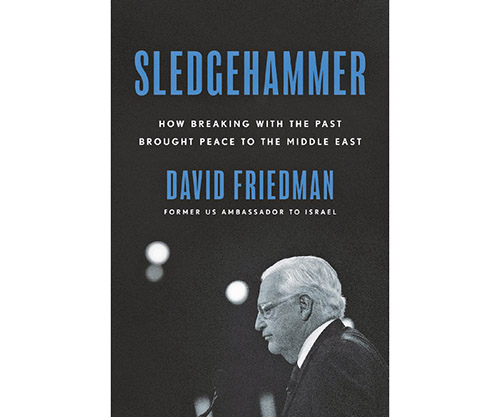
Reviewing: “Sledgehammer: How Breaking With the Past Brought Peace to the Middle East” by David Friedman, Broadside Books. 2022. Hardcover. 272 pages. ISBN-13: 978-0063098114.
“The US-Israel policy that existed when we took office was simply beyond repair,” noted David Friedman, U.S. Ambassador to Israel during the Trump administration, in this extremely fascinating, candid and insightful memoir. “It was dominated by self-proclaimed experts with no real-world negotiating experience who were perfectly content to repeat the same failed approach time and time again in the futile hope of a different outcome.”
He could have added that the conflict between Israel and the Arabs in Judea, Samaria and Gaza remains intractable because the U.S. and the West have refused to hold them accountable for the homicide bombers; pervasive incitement in the schools, mosques and social media; attempts to deny Jewish connection to the land of Israel; the Jewish refugees expelled from Arab countries; or the deadly car rammings, rock-throwing and fire-bombing attacks, beatings and stabbings.
Dennis Ross, who served as President Bill Clinton’s Middle East peace envoy, and David Makovsky, director of the Washington Institute for Near East Policy on the Middle East Peace Process, argued that “of all the policy myths that have kept us from making real progress in the Middle East, one stands out for its impact and longevity: the idea that if only the Palestinian conflict were solved, all the other Middle East conflicts would melt away.” Yet, in 2016, U.S. Secretary of State John Kerry proclaimed that “there will be no advanced and separate peace with the Arab world without the Palestinian process and Palestinian peace. Everybody needs to understand that.”
Instead of being wedded to failed policies that have enabled, encouraged and rewarded Arab intransigence—and allowed them to portray themselves as the eternal victim when they are the true oppressors and even violators of the human rights of their own people—Friedman forged a new approach based on reality, not fantasy. In the process, he placed disputed issues and the security, demographic and economic challenges in the conflict in proper historical and legal context; in his book, he presents them in a clear and concise manner.
Having no prior diplomatic or government experience served Friedman well. His responses to the lies, myths and distortions against Israel demonstrate a profound understanding of the roots of the conflict. They should be used in any effort to prepare students for the fabrications they will encounter on American campuses. The one area that should have been emphasized is that for the PA and Hamas, this is a religious war, which is the primary reason the conflict has not been resolved.
During the confirmation process, Friedman encountered a concerted effort by J Street, a number of Democrat senators (including prominent Jewish ones) and five former American ambassadors to Israel, to thwart his appointment. He viewed the ambassadors’ letter, in which they claimed he was not qualified for such an important post, as a “cheap shot,” especially since none of them knew him. And “none of them had a particularly successful tour of duty that would have entitled them to pass judgment on someone else,” he said.
A warning by Senator Marco Rubio helped Friedman navigate through the “unprecedented,” perilous hearings. He told Friedman that he was being confronted by an orthodoxy within the State Department and the “so-called smart people within the American foreign policy establishment,” who sought an impartial approach to dealing with the Israelis and Arabs, even though Friedman noted, “Israel was our most important ally in the region” and the Arabs in Judea, Samaria and Gaza “remained engaged in terror.” Significantly, the only two Democrat senators who voted for Friedman’s confirmation were Robert Menendez and Joe Manchin.
At one point after it became clear that Friedman’s “stubborn insistence on standing with our ally Israel,” when the State Department sought to obstruct his efforts at every opportunity, prompted one department official to offer him “just a free word of advice—‘Don’t be so Jewish. You represent the United States of America. Tone down the Judaism in your work.’”
The State Department’s antipathy toward Zionism has deep roots. Naomi Cohen quotes a survey conducted in the 1920s concerning the attitude of midlevel managers in the State Department’s Division of Near Eastern Affairs, who shaped American policy for the region. The study found the group to be “insulated and inbred, elitist” and members “of the upper middle class” who relied on the expertise of foreign service officers who shared a “common disdain” for Zionism. Not much has changed.
Although he is quick to identify his successes, Friedman is equally quick in crediting people like Jason Greenblatt, Jared Kushner, Avi Berkowitz, Aryeh Lightstone, Mike Pompeo, Nikki Haley and many others for their significant contributions to the successes they achieved. He unabashedly admits to his mistakes. Without the backing of President Trump, none of the many successes—moving the U.S. embassy to Jerusalem, recognizing Jerusalem as the eternal capital of Israel, recognizing Israel’s sovereignty over the Golan Heights and forging the Abraham Accords—would have occurred. Israel and world Jewry owe the president a tremendous amount of gratitude.
A Final Note
The present American ambassador to Israel has reverted back to the doomed, futile and disastrous tactics of the past, which demonstrates either a willful ignorance of the issues or a nefarious attempt to reverse the historic successes of the Trump administration. The U.S. and Israel would greatly benefit if there were more ambassadors like David Friedman. As The New York Times acknowledged when he completed his tour of duty, Friedman has “etched his name as one of America’s most influential envoys.”
Dr. Alex Grobman is the senior resident scholar at the John C. Danforth Society, and on the advisory board of The National Christian Leadership Conference of Israel (NCLCI). He lives in Jerusalem.













